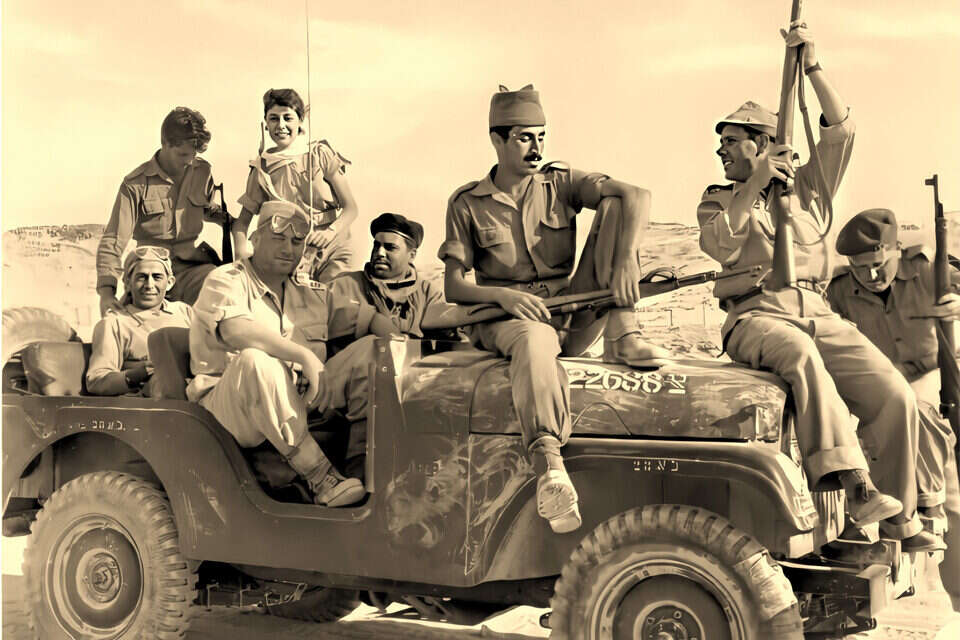Hey Jeep!
Already at the beginning of the country, ideas were raised to establish an automobile industry in Israel, which would also serve the needs of the army.
"In the early 1950s, this was considered madness," explains Benny Aviad, an expert in the development of knowledge and training infrastructure systems for the automotive industry.
"The country was only two years old, the port services were limited, the electricity infrastructure was poor, knowledge in the field of the car industry was not available, nor were the required equipment and accessories."
Fortunately, three giants of a generation who were considered "crazy" to speak established the automobile industry in Israel from nothing.
In the photo: a patrol unit on an Israeli jeep in Sinai, 1956.
Pioneers in the industry
Ephraim Ilin, photo: Wikipedia
Ephraim Ilin was one of the three pioneers of the Israeli automobile industry.
As an ETL man, he knew how to combine successful businesses with activities for the benefit of the country on the way. In September 1950, about two and a half years after the declaration of independence, the "Kaiser-Illin Industries" car factory was inaugurated on the outskirts of Haifa, where parts ("kits") of vehicles were assembled into passenger cars Vehicles designed and manufactured abroad, including Kaiser Manhattan, Henry G, Dauphin, Contessa, Hino-Briska van and more.
The upgraded cars were mostly directed to private use, alongside vehicles that were also intended for the service of the IDF and the police.
Otto the Emperor
The American Jeep in the CJ series, photo: Wikipedia
The American Jeep in the various CJ series (pictured) was the highlight of the production of military vehicles at the "Kaiser-Ilein" factory.
This Jeep has gained a fine reputation and is exported from Israel to dozens of countries in the world.
Another Jeep produced at the factory near Haifa was the Willys, in the pickup and station wagon series that were taken over by the police, and in the IDF the pickup version was used by officers with the rank of major
A prestigious army
Studebaker Lark, photo: Nostalgia Online website
The Studebaker Lark was a compact American car, and in Israel it was considered a luxury car (saloon car).
About 4,000 units of it were assembled by "Kaiser-Illin" Industries in the years 1960-1967, in two models.
The car quickly became a favorite of the IDF's procurement personnel and was supplied to officers from the rank of colonel and above, up to the Chief of Staff. The Lark's huge (for its time) engine, 4,250 cc that produced 180 horsepower, made this vehicle a favorite of "robbery drivers" .
Fiberglass experiment
Yitzhak Shubinski, photo: Wikipedia
In the mid-1950s, Yitzhak Shubinski (pictured), an accountant and international businessman, founded the "Autocars" factory.
Knowing the global car market and the effects of the Arab boycott, Shubinsky realized that he had to think outside the box, also because of the limitations of the young Israeli industry in the field of metal processing - and invented a car body made of fiberglass.
From this basic material, cars were created in "Autocars" that have become local mythology over the years.
Our own van
Susita, photo: Nostalgia Online website
In 1961, after several years of failure in the production of fiberglass cars, Autocars marketed about 800 Susita model cars.
This vehicle, which received the nickname "Cube" due to its somewhat clumsy shape, soon turned out to be a success.
In a short time, the Susita was also produced in a van version (pictured), which was purchased by the IDF, and in 1962, Autocars brought the Carmel to the market, a compact family car whose two-door version, the Carmel Duke, was purchased by the IDF as a vehicle attached to lieutenant colonels .
The national car
Ford Escort, photo: Facebook - "Vehicles of the past in Israel blog"
The Ford Escort (pictured) was one of the great successes of "Autocars" during the factory's years, as a private car - and in the service of the IDF. The well-known name of the American manufacturer, Ford, made its mark among potential customers, and the "kits" - the assemblies produced on by Ford and sent to Autocars for assembly in Israel - they were of high quality. Indeed, sales skyrocketed: about 33,000 Ford Escort cars were sold to the people and the IDF.
terrain track
Businessman Yosef (Joe) Buxenbaum, photo: Plim website
Commanders made in Nazareth, photo: Nazareth Illit Automotive Industries Archive
Rio truck, photo: Wikipedia
In 1966, the "Nazareth Illit Automotive Industries" factory was established by the "Traffic Devices" company, owned by the businessman Yosef (Joe) Buxenbaum, for the purpose of assembling and manufacturing various types of vehicles, intended mainly for the military and the police.
Among these: Rio (below) and Dodge trucks.
Commanders (above) called NN (weapon carrier) were also produced, and these were finally replaced by the Knight and Storm vehicles, developed in the 1980s and 1990s in cooperation between the factory and the IDF.
were we wrong
We will fix it!
If you found an error in the article, we would appreciate it if you shared it with us

